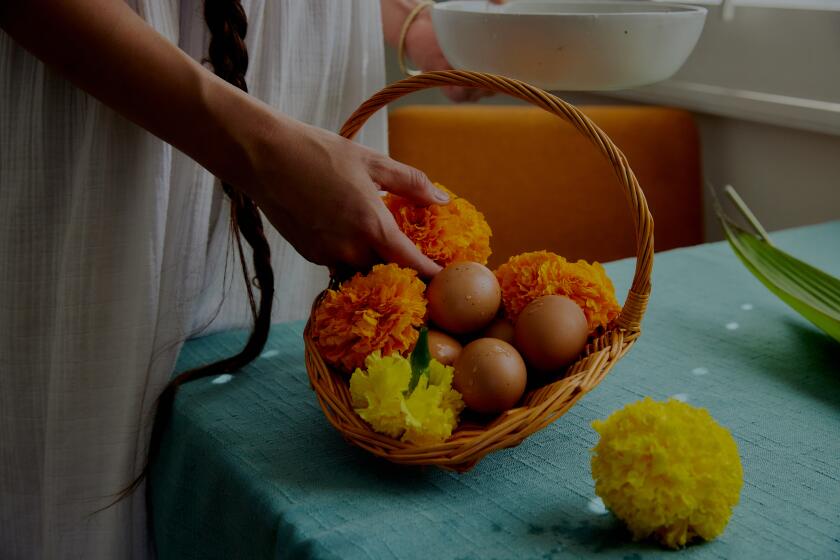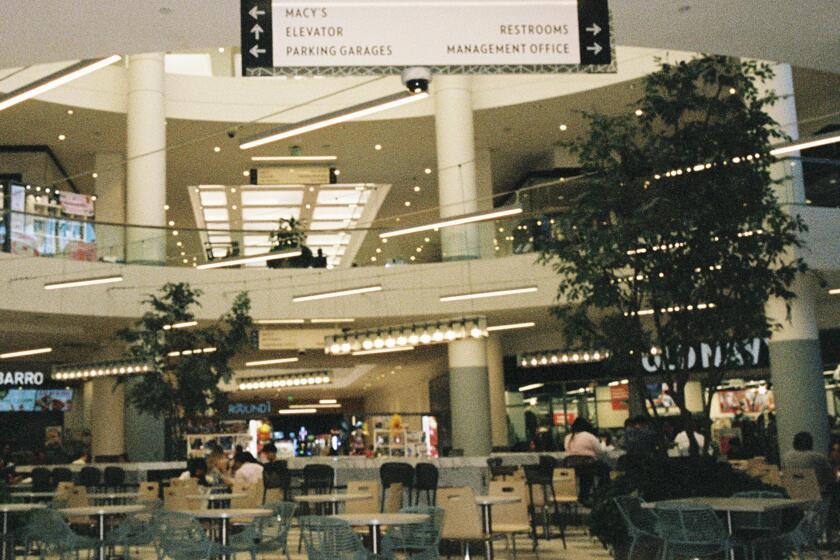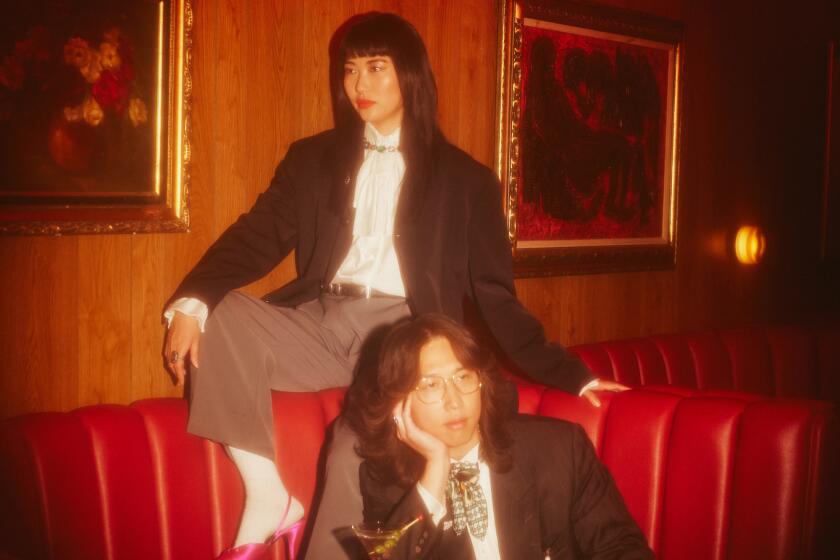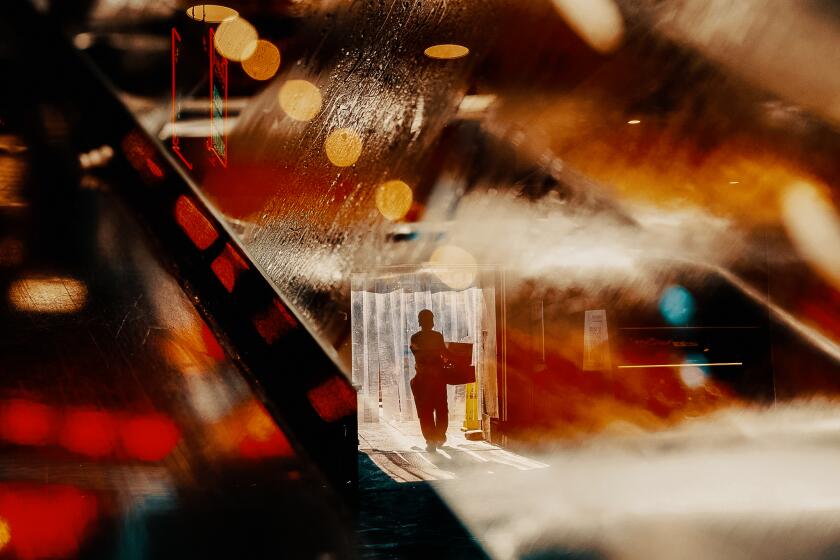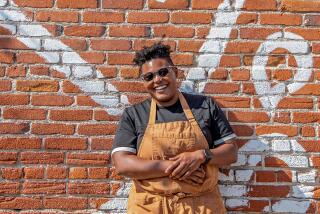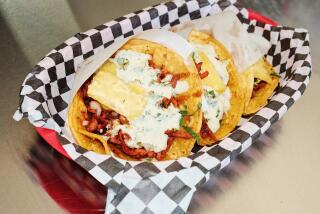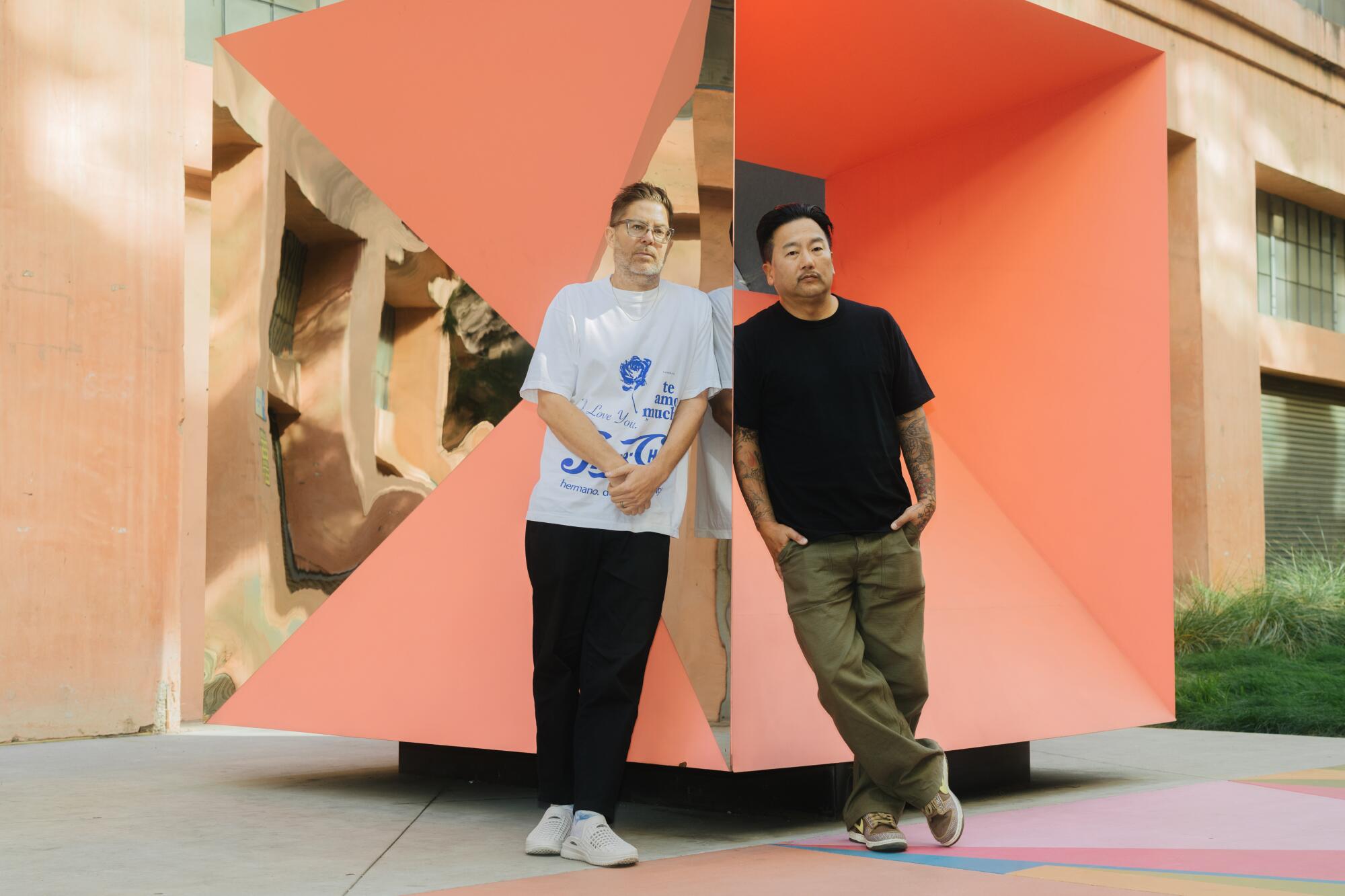
- Share via
This story is part of Image Issue 15, “Diaspora,” a fantastic voyage through the mecca of food, from Hollywood haunts to mall food courts to L.A. staples. Read the whole issue here.
Josh Kun and Roy Choi have been talking about food together for around a decade now. The two L.A.-raised friends first met in 2013, when Choi, already renowned for his Korean taco truck Kogi, had just given a talk at the MAD Symposium about how to reckon with widespread hunger as a chef. Three years later, Choi was writing the foreword to Kun’s ingenious book “To Live and Dine in L.A.,” a deep dive into this city’s food history through the lens of 200-plus menus in the collections of the Los Angeles Public Library. Kun, a professor at USC, credits Choi with helping him to “not be blinded by the archive” and to hone in on the bigger questions, like: What is food for? What does it mean to be a chef? What does it mean to feed people?
In 2022, Kun and Choi continue to unpack these questions, as they consider what it means to really care for the people of L.A. through food, and the forces that are preventing this care from thriving.
Josh Kun: I’m at a moment in my career where I’m thinking a lot about the question of service. What have you learned from leading a kitchen, where your name might be associated with the restaurant, but you’re nothing without your team?
Roy Choi: It evolves along the way. In the beginning, you are a team. But as things grow, you have to step out and be the captain and navigate. But the romantic dream for a lot of chefs and even myself — Kogi was supposed to be that — is you’re touching every single thing that goes out and your head is down and that’s all you do. That’s what we all want. But it’s hard, because if you don’t step away, you’re not going to grow. You’re always a player one moment in life, and then you transition eventually to coach and then that becomes, I think, the biggest spiritual growth part because you step away from your ego. People think you’re actually stepping into your ego because you’re on the front of the magazine, I’m doing this interview with you. But really, you’re stepping away from your ego. Sometimes the beginning is your ego because it’s all about you. It’s all about your flavors. It’s also about, this is my art. But you as you grow, you’re seeing the whole picture. All you’re thinking about now — you become like a father or a parent — is, how can I help each person grow and maximize their potential and improve their life? It’s a weird thing, because a lot of times your life has not improved, and you’re struggling to pay your bills, but then you transition yourself into caring about others versus yourself.
Josh Kun: When you and I first met, right on the heels of your MAD talk, you were deep into this question of how to square what you were doing, making food and the flourishing restaurant scene in L.A., with all the hunger that was blowing up alongside of it.
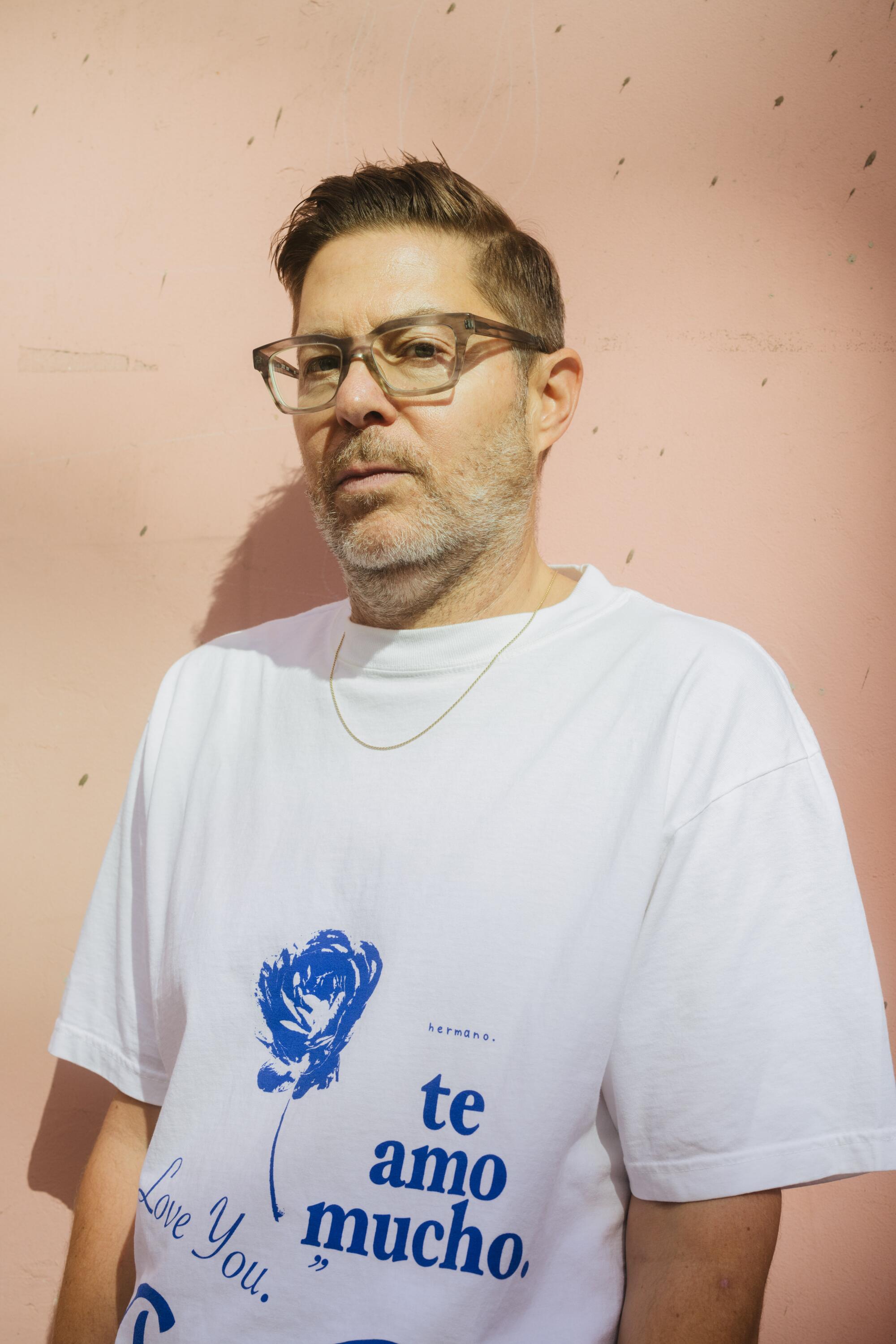
Roy Choi: My speech at MAD was the dilemma of hunger and how street food could be the answer. I don’t think anything’s changed. I think it’s gotten worse. Look at our public-school systems, look at the lobbying of food that is still infiltrating the most vulnerable of our students and our kids and our populations and our futures. It’s gotten even worse as far as the food getting even worse, the preservatives getting worse — it’s almost like the drugs, you know, the drugs have gotten stronger. You could use that same metaphor for the infiltration of preservatives and chemicals into our foods, and what is being served, the lack of opportunity. Nothing has really changed that much as far as prosperity and entrepreneurship and development south of the 10 Freeway in Los Angeles. It’s still a game of haves and have-nots. It’s the most bizarre and unfathomable concept of raising a society that you could ever think of. You think of any other society, and the way that they feed not only each other, but especially their children — children are the most vulnerable, because everything is developing, right? It’s the muscles in the organs, and everything is so fertile. Imagine if you take fertile land, and in that most fertile point where things are just starting to sprout, you’re just pouring chemicals, and almost consciously trying to destroy it and poison it.
JK: At your MAD talk, you made a call that whoever invests in a new restaurant in L.A. needs to invest in a restaurant in a neighborhood impacted by food apartheid and food deserts. What’s been holding back that shift from happening? Is it at the chef level, the investor level? Or is it just structural, and it’s impossible to move that rock up the mountain?
RC: Things have moved a little bit, as far as there have been opportunities for chefs and developers and restaurateurs to make a difference. But I think a lot about how you can’t hold people responsible that don’t have any connection or idea of really what’s going on. The idea of having people who never grew up in the hood say, “I’m going to make sure that every restaurant that opens also takes care of the most marginalized,” is an idealistic idea that I still believe in, but I can’t expect every chef to understand those things and put them on top of their importance list. But I think, at the end of the day, chefs care; they want to feed everyone. But they’re also struggling to figure things out for themselves. A lot of them get caught up in the loop of investment and bankers and money and people telling them where it’s most lucrative. For me, I always try to hold on to the little kid within me. Whenever people tell me what’s important, I always try to take a step back and challenge that in life. I use my skeptical teenage, dark self as a measuring stick for everything, and I ask that young version of myself, what do you think about all this? Are you suspicious of it?
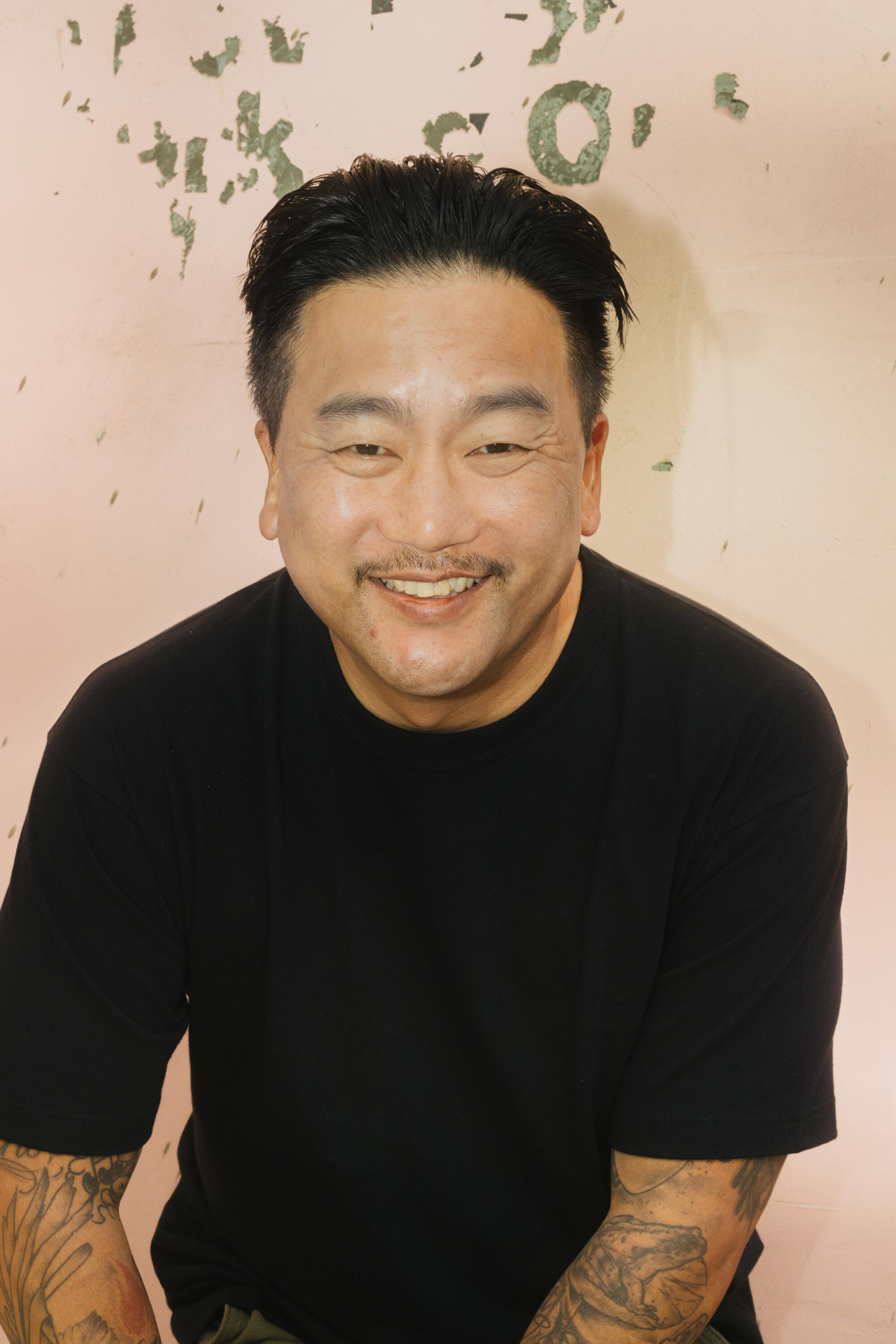
But to answer your question, what hasn’t allowed things to evolve in feeding the most vulnerable is the businesspeople, is real estate, banking, developers, venture capitalists. Nobody cares, nobody gives a f—. Even with all this virtue signaling, word-salad companies building themselves upon saving the environment and narrowing the wealth gap — I don’t understand how we can consciously be so aware, and so verbally focused on healing society, yet we’re further away than we’ve ever been.
JK: I remember having versions of this conversation way back, about what you were trying to formulate as ethical capitalism, for-profit social change. Obviously, LocoL, the revolutionary fast-food/fresh-food restaurant you founded in Watts with chef Daniel Patterson in 2016, was an attempt to do that.
RC: With LocoL, a lot of people questioned why we were for-profit, and I’ll just put it on wax as far as why LocoL was created in the manner that it was. We were trying to confront and look at the whole absurdity of our celebrity and our place within the culinary universe, and whatever power and attention that we had garnered at that moment and use that almost as a bait and switch to bring people to 103rd and Grape Street — you know, to bring people to the hood, to bring people to the projects. So that if you believed in anything that we did as chefs, that you could see the beauty and not the stereotype of what our neighborhoods are going through. The ultimate goal — why it was for-profit, because there was a five-year plan — was for it to hopefully become the next hottest restaurant and then we’d just hand it over to the neighborhood as the beginning of a new legacy of economic development. It would be owned like a co-op from the neighborhood, and then that would be a model that would set off hopefully a whole new chain of events for the future. That was the idealism of it all.
For L.A. food artists, culinary style is its own choreography.
Because the economic structure is so complicated, difficult as a retail business, it lasted three years. But really, the success of LocoL, even in its failure, is that a lot of people from our network and our family, within LocoL, were able to get past their past. We hired within the neighborhood. If you look at what’s happening in any inner city in America, you have generations of residents that fall into the cracks of the system that end up with felony records or don’t have experience to be able to get a job. We also have the physical situations for us as minorities in this country of just how we look. But because they had LocoL on their resume, a lot of employers and investors and banks finally were able — and I’m not saying that we are heroes — I’m just saying that just for a microsecond, people were able to see other people for who they are as people, not for what they did in their past.
JK: As you were just talking, you used a word I’ve never heard you use before in talking about LocoL — “failure.” I remember when LocoL’s retail side shuttered and there was a lot of media attention, a lot of headlines, celebrating, in my opinion, the failure of LocoL in a weird way. And I remember just barking on social media, don’t use the word “failure,” because that’s actually part of a language of capitalist achievement. This was a project, as I saw it, that can’t “fail.” It’s ongoing. Like all forms of struggle.
RC: Thank you for breaking that word apart. Because it was never a failure in my mind. As you say, we didn’t shut the doors on the progress or the project itself. But one facet of it had to close, and unfortunately, that facet was the front-facing facet that people judged everything on. I’ve had a lot of time to reflect on it; I’m at a more peaceful state with it all. But I still question why everyone had such a fascination with the rise and fall of it all.
JK: One of the key lessons of the pandemic was that food became an actual model for how to take care of people, and how to decentralize and create community and keep people alive. Is the food world still tappable as a model for how to have larger social change?
RC: Yeah, absolutely. But people get disillusioned by — again, using the word salad — words like, “supply chain,” “costs are high,” “we have to raise prices,” “the labor force doesn’t want to work anymore.” This is all just rhetoric to convince ourselves to be selfish.
Kogi was about five days away from going bankrupt because, with the pandemic, we lost everything. I could have fallen into the trap of all that word salad stuff — by cutting jobs and basically trying to get the water out with a bucket — or I could have doubled down and said, f— it, if we’re going down, let’s go down the way we started. Let’s just feed as many people as we can, give everything away. And by doing that, it saved Kogi. There’s currency and value in caring for each other. In that year and a half where we stopped making profit and only focused on feeding people, it opened up a whole new, idealistic economy. People started asking us to open a Venmo account and everyone started donating. My promise was that there would be no profit as long as we can use the money to keep all of our team employed and feed as many people that lost their jobs. And that energy kept us alive until the world opened back up. You can’t say that’s not real.
JK: I wanted to ask you about an idea you were messing around with, pre-pandemic, about creating a shop or an agency or a lab that would merge social justice with food, streetwear, and TV and film production elements. Where are you now in your thinking about actualizing or putting this out in the world?
RC: I’m still working on that. I think a part of it that has slowed me down is that I still care about the dilemmas of society too much — I’m not focused on making everyone money all the time, and that includes studios and investors.
One big thing is I’m finally starting my own foundation this year — this is the first time I’m talking about it. We’re going to start probably in Watts, and it will start with direct scholarships for kids from the projects to go to college, but then that’s going to grow into many other facets into feeding the neighborhoods, providing access to kitchens, and food and distribution. Eventually, the big goal is to create a learning center that will become a place where the most brilliant minds and the most powerful people — not just in money but in their impact within culture and life — can come together and provide pathways for the next generations. I’m speaking in hyperbole now — if this becomes everything that I see in my mind, then what will happen is you will have a direct effect on change, because you will be flooding the marketplace with voices and perspectives of people that have never historically been able to get through the door.
Which leads back to your question — I haven’t figured out how to actualize getting the streamers or the studios or these networks to invest in the stories that I believe are valuable. As a chef, I have complete confidence — I can get anyone to believe or invest or understand anything when I’m behind the stove. It’s like a DJ when they can make a whole room dance. As a chef, I know how to make the room move. I know how to make people jump out of their seats and lick their fingers and completely come out of their body. I haven’t figured that out yet when pitching a show or getting venture capitalists to give me tens of millions of dollars to actualize it.
JK: But your network is pretty singular — so many people from so many different communities with so many different stories to tell. You need to galvanize it; you need to leverage it. We are all here for you.
RC: Well, thank you. Maybe this interview is going to help me confront that. I’m shy, I’m stubborn — I want to break off half of my loaf and give it to you; I don’t want to ever burden anyone with helping me.
JK: One of my favorite things to watch right now are your vlogs on Instagram. You’ve done how many as of today?
RC: 78.
JK: I’m curious what made you want to go out every day by yourself and film yourself eating. One thing that has emerged in those is you keep letting slip autobiographical stories, and I love the way that the restaurants, that eating, is allowing you to tell your story again.
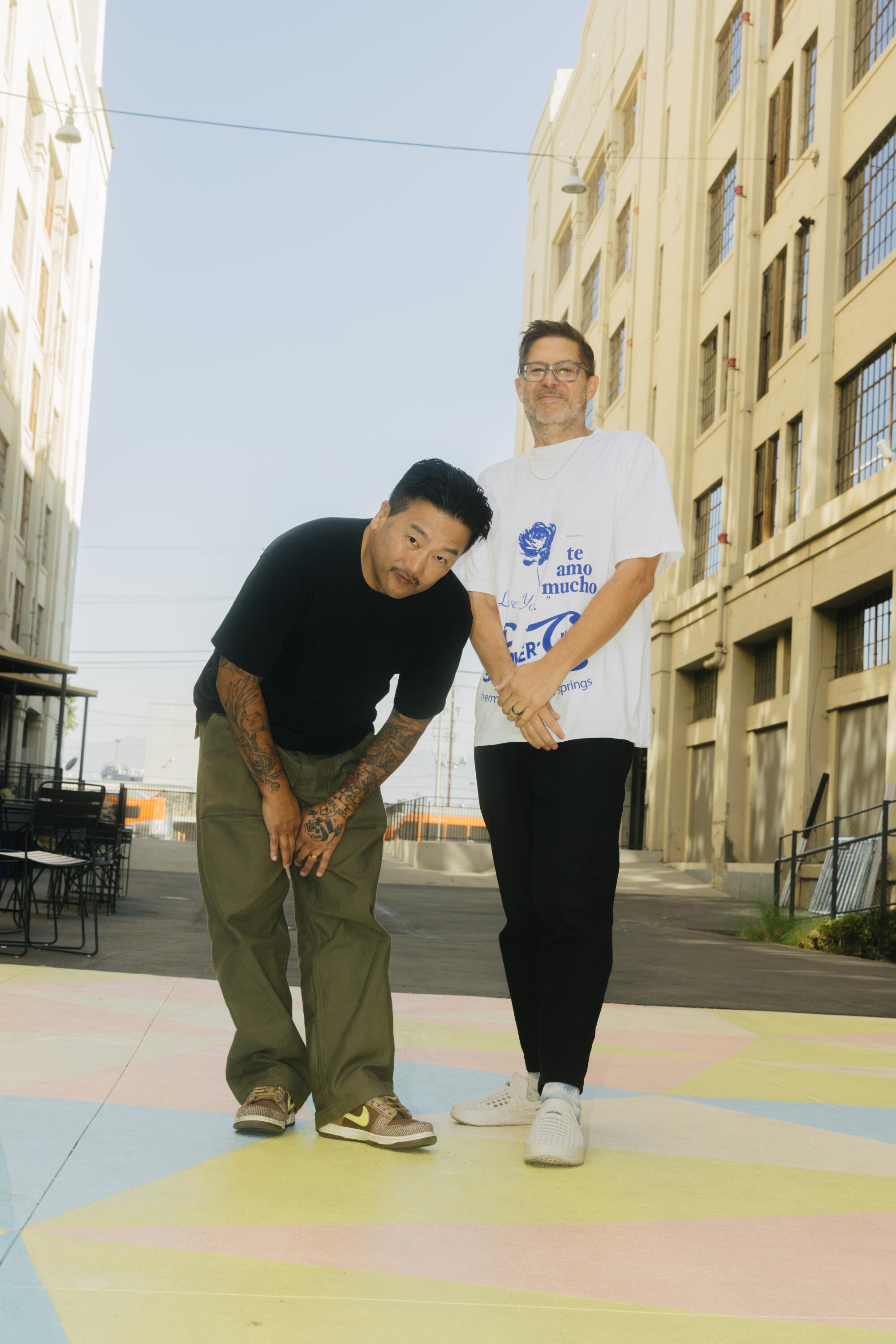
RC: I had just come off of a couple very hurtful media pitches where I thought they were it. There was a vacuum that needed to be filled. As a creative person, when you are in that kind of vapid, in between space, it’s very dangerous sometimes — you’re very restless, you start to think very dark thoughts about your worth and whether you have anything to say anymore. You lose your perspective. So, I was in that space, and I was just eating, and I told the person I was eating with to just turn the camera on. I don’t know what I was trying to do. It was just like, let me talk to the camera. And it started to become something that filled that empty space. I just wanted to put something genuine into the universe — not anything for personal gain, but like a Mister Rogers thing. Whatever that return would be, it didn’t matter.
Nothing is produced or premeditated — all of them are my real meals. It’s just literally what I’m eating that day for lunch.It naturally became a way to find the language [to talk about] the places that matter to me, that aren’t always on the front page of every media. These 78 places started to become restaurants that aren’t driven by chefs, that are all throughout the city, that are mom-and-pop restaurants and small businesses and street stands — because this is all just within the natural flow of real life.
The reaction to it has been amazing because I never thought more than 200 people would watch it — 200,000 people or so watch it. It helped me get through it all, and it helped me continue to believe that this type of storytelling matters. It’s just sometimes we’re conditioned to believe that that’s not valuable. Going back to the ethos of Kogi, bringing people together, families together, fathers and kids together, broken relationships together, generations together — my whole ethos is just making people smile and feel loved and nourished.
Josh Kun is an author, curator and cultural historian. His books include “Audiotopia: Music, Race, and America, Songs in the Key of Los Angeles,” “To Live and Dine in L.A.” and “Double Vision: The Photography of George Rodriguez.” He is a professor in the USC Annenberg School of Communication and Journalism, where he holds the Chair in Cross-cultural Communication. He is the proud board chair of Alma Backyard Farms, based in Compton. @joshdkun
More stories from Image
